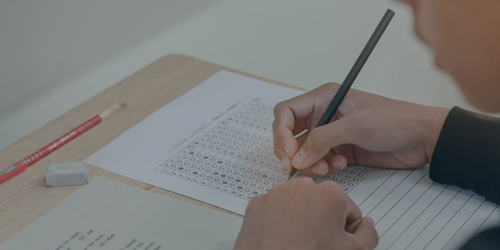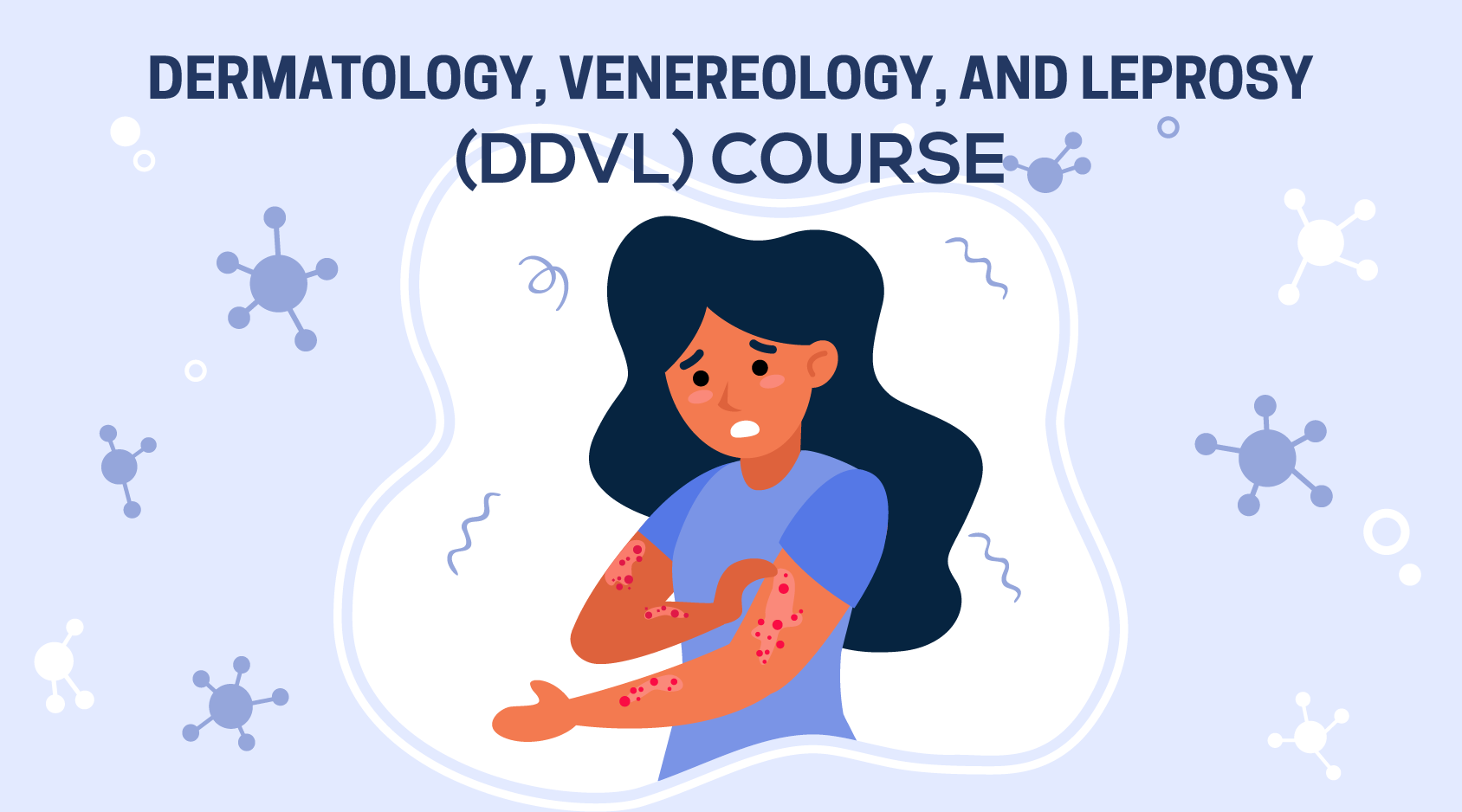Dermatology, Venereology and Leprosy Meaning:
Dermatology, Venereology, and Leprosy course is a study of different types of diseases related to skin, hairs, and nails. This course has a speciality of combing both medical and surgical aspects. It aims at providing complete training in diagnosing and suggesting preventives for different types of skin diseases, cosmetic dermatological diseases (including leprosy). However, the Dermatology, Venereology, and Leprosy course also provides the skill of attending different types of medical emergencies efficiently. Read the article to know the complete course details.
What the course focuses on?
- Diagnosing and managing common skin diseases, sexually transmitted diseases, and leprosy.
- Preparation for medical emergencies related to skin, leprosy, and venereal disease.
- Preventive measures at individual and community levels against communicable diseases.
- Analyzing different types of symptoms related to the disease.
Highlights:
| Course Name | Dermatology, Venereology, and Leprosy |
|---|---|
| Course Level | Undergraduate and Postgraduate |
| Duration | 3 Months - 3 Years |
| Examination Type | Yearly/ Semester |
| Eligibility | Varies with degree |
| Admission Process | Merit and Entrance based admission |
| Top Recruiters | Hospitals, Physicians, Integrative Healthcare Clinics, Public Health Clinics, College Health Centers, Natural Apothecaries, Military Retirement Homes |
| Top Career Scopes | Medical Dermatologist, Cosmetic Dermatologist, Dermatology Professor, Therapy Manager- IVF Artificial Reproduction, etc |
Top Colleges:
Some of the top colleges that provide a degree in Dermatology, Venereology, and Leprosy are mentioned below:
- Guwahati Medical College, Assam
- Kasturba Medical College, Manipal
- All India Institute of Medical Sciences, Delhi
- Armed Forces Medical College, Pune
- Jawaharlal Institute of Postgraduate Medical Education and Research, Puducherry
- St. John's Medical College, Bangalore
- Stanley Medical College, Chennai
- Amrita Vishwa Vidyapeetham, Coimbatore
- Aligarh Muslim University, Aligarh
- Assam Medical College, Assam
- Jagadguru Jayadeva Murugarajendra Medical College, Karnataka
Dermatology, Venereology, Leprosy Course Eligibility:
| Courses | Duration | Eligibility | Entrance |
|---|---|---|---|
| Diploma in Dermatology, Venereology, and Leprosy [DDVL] | 2-3 years |
|
NEET and University level exams (Self-conducted) |
| Postgraduate Diploma in Dermatology, Venereology, and Leprosy [PGD DVL] | 2 years |
|
AIIMS PG, NEET PG, JIPMER PG |
| Doctorate of Medicine in Dermatology, Venereology, and Leprosy [MD DVL] | 2-3 years |
|
AIIMS PG, NEET PG, JIPMER PG |
Skills Required:
- Reading comprehension
- Active listening
- Writing
- Speaking
- Science
- Critical thinking
- Active learning
- Monitoring
Syllabus:
- Diploma in Dermatology, Venereology, and Leprosy [DDVL]
| Semester I | Semester II |
|---|---|
| Introduction - Historical Aspects and Epidemiology | Epidermal skin tumors |
| Comparative dermatology | Anatomy and organization of human skin |
| Tumours of the skin appendages | Disorders of skin color |
| Diagnosis of skin diseases | Histopathology of the skin-general principles |
| Lichen planus and Lichenoid disorders | Melanocytic Naevi and Malignant melanoma |
| Functions of Skin | Disorders of sweat glands |
| Disorders of connective tissue | Disorders of the sebaceous glands |
| Clinical immunology and allergy | Bullous eruptions |
| Inflammation | Naevi and other developmental defects |
| Semester III | Semester IV |
|---|---|
| Neonatal Dermatoses | Prenatal diagnosis of skin disease |
| Genetics and Genodermatoses | Pruritus |
| Rosacea, Flushing, and Perioral Dermatitis | Eczema, Lichenification, Prurigo, and Erythroderma |
| Atopic dermatitis | Disorders of blood vessels |
| Purpura | Neurobiotic disorders |
| Contact dermatitis | Diseases of the veins and arteries including leg ulcers |
| Irritants and Sensitizers | Histiocytosis |
| Cutaneous vasculitis | Urticaria |
| Occupational dermatoses | Mastocytosis |
| Reactions to mechanical and thermal injury | Disorders of lymphatic vessels |
- Postgraduate Diploma in Dermatology, Venereology, and Leprosy [PGD DVL]
| Subject Name | Subject Name |
|---|---|
| Introduction, Historical aspects, and Epidemiology | Epidermal skin tumors |
| Comparative dermatology | Tumours of the skin appendages |
| Anatomy and organization of human skin | Melanocytic Naevi and Malignant melanoma |
| Functions of Skin | Disorders of skin color |
| Diagnosis of skin diseases | Bullous eruptions |
| Histopathology of the skin-general principles | Lichen planus and Lichenoid disorders |
| Inflammation | Disorders of the sebaceous glands |
| Clinical immunology and allergy | Disorders of sweat glands |
| Genetics and genodermatoses | Disorders of connective tissue |
| Prenatal diagnosis of skin disease | Disorders of blood vessels |
| The Neonate | Rosacea, Flushing, and perioral dermatitis |
| Naevi and other developmental defects | Urticaria |
| Pruritus | Purpura |
| Eczema, Lichenification, Prurigo, and Erythroderma | Cutaneous vasculitis |
| Atopic dermatitis | Diseases of the veins and arteries including leg ulcers |
| Contact dermatitis | Disorders of lymphatic vessels |
| Irritants and Sensitizers | Noorobiotic disorders |
| Occupational dermatoses | Histiocytoses |
| Reactions to mechanical and thermal injury | Mastocytoses |
- Doctorate of Medicine in Dermatology, Venereology, and Leprosy [MD DVL]
| Subject Name | Subject Name | Subject Name | Subject Name |
|---|---|---|---|
| Allied Basic Sciences | Clinical Dermatology | Skin Manifestations of Hematologic Disorders | Topical Agents |
| Papulosquamous Diseases & Disorders of Keratinisation | Vesiculo-Bullous Disorders | Skin Manifestations of Systemic Disease | Systemic Therapy |
| Disorders of Epidermal Appendages and Related Disorders | Epidermal and Appendageal Tumours | Skin Manifestations of Rheumatiologic Disease | Photochemotherapy and Phototherapy |
| Disorders of Melanocytes | Inflammatory and Neoplastic Disorders of The Dermis | Cutaneous Manifestations of Diseases in Other Organ Systems | Dermatosurgery |
| Lymphomas, Pseudolymphomas Related Conditions Disorders of Subcutaneous Tissue | Disorders of The Mucocutaneous Integument | Bacterial Diseases with Cutaneous Involvement | Venereology |
| Cutaneous Changes in Disorders of Altered Reactivity | Skin Changes Due to Mechanical and Physical Factors | Fungal Diseases with Cutaneous Involvement | Leprosy |
| Photomedicine, Photobiology, and Photoimmunology In Relation to Skin | Disorders Due to Drugs and Chemical Agents | Viral and Ricketsial Disease | Practicals |
| Dermatology and The Ages of Man | Skin Lesions in Nutritional Metabolic and Heritable Disorders | Topical Therapy |
Admission Process:
The top institutes provide this course based on the student's score in a relevant particular entrance test (National /State), some even have an extra round of Personal Interview. Some colleges conduct their own entrance tests for a degree in Dermatology, Venereology, and Leprosy (DVL). The admission process generally varies across colleges. A few institutes also offer admission based on candidate’s merit i.e. aggregate marks secured in the last academic session.
Top Entrances:
- Minimum Qualification: The candidate needs to have an MBBS degree from any university recognized by the Medical Council of India or State Medical Councils.
- Exam Duration: 3 Hours
- Exam Mode: Online
- Minimum Qualification: Candidates must have an MBBS degree that should be recognized by the Medical Council of India.
- Exam Date: 5th January 2021
- Exam Mode: Online
- Exam Mode: Online
- Total number of questions: 250
- Exam Duration: 3 Hours
Career Scope:
| Career Profiles | Average Annual Salary |
|---|---|
| Medical Dermatologist | Rs 9.5 lakhs |
| Cosmetic Dermatologist | Rs 8.5 lakhs |
| Dermatology Professor | Rs 7.5 lakhs |
| Therapy Manager- IVF Artificial Reproduction | Rs 4.5 lakhs |
Top Recruiters
- Hospitals
- Physicians
- Integrative Healthcare Clinics
- Public Health Clinics
- College Health Centers
- Natural Apothecaries
- Military Retirement Homes
Top Hiring Cities:
- Delhi
- Mumbai
- Bangalore
- Hyderabad
- Kolkatta
FAQ's:
Q: What are the primary objectives of this course?
A: Listed here are some of the primary objectives of the course:
- To diagnose and manage common skin diseases, sexually transmitted diseases, and leprosy.
- To manage efficiently all medical emergencies related to skin, leprosy, and venereal disease.
- To adopt preventive measures at individual and community levels against communicable and venereal diseases and leprosy.
- To teach requisite knowledge and laboratory skills to other medical/ paramedical team members.
- To adopt a compassionate attitude towards patients (and their families) under one’s charge.
- To evaluate and initiate an investigation for solving problems relating to skin and venereal diseases and leprosy.
Q: What is the minimum eligibility criteria for studying Dermatology, Venereology, and Leprosy?
A: To pursue a career in Dermatology, Venereology, and Leprosy, candidates need to satisfy the following criteria:
- Candidates should have obtained an MBBS Degree from an institution recognized by the Medical Council of India (MCI).
- Candidate should have completed a 1- year compulsory rotating internship after passing the final professional examination which is MBBS before 30th April of the academic year.
- Candidates in possession of an MBBS degree or Provisional MBBS Pass Certificate recognized by the Indian Medical Council Act 1956, besides a permanent or provisional registration certificate of MBBS qualification issued by the Medical Council of India or State Medical Council and have completed 1 year of internship or/ are likely to complete the internship on or before 31st March or 31st April of the relevant year may apply for NEET-PG through the online application system.
Q: What are the entrance exams for getting into Dermatology, Venereology, and Leprosy?
A: AIIMS PG, NEET PG, JIPMER PG are some of the best entrances exams for entry into this course.
Q: What are the skills required for studying Dermatology, Venereology, and Leprosy?
A: Here are the skills required for the course:
- Reading comprehension
- Active listening
- Writing
- Speaking
- Science
- Critical thinking
- Active learning
- Monitoring
Q: What are the top colleges for Dermatology, Venereology, and Leprosy?
A: Here are the top colleges for this course:
- Guwahati Medical College, Assam
- Kasturba Medical College, Manipal
- All India Institute of Medical Sciences, Delhi
- Armed Forces Medical College, Pune
- Jawaharlal Institute of Postgraduate Medical Education and Research, Puducherry












